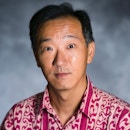The Riemann Hypothesis
- Speaker
-
 Ken Ono, Ph.D.Asa Griggs Candler Professor of Mathematics, Emory University
Ken Ono, Ph.D.Asa Griggs Candler Professor of Mathematics, Emory University
Presidential Lectures are a series of free public colloquia spotlighting groundbreaking research across four themes: neuroscience and autism science, physics, biology, and mathematics and computer science. These curated, high-level scientific talks feature leading scientists and mathematicians and are designed to foster discussion and drive discovery within the New York City research community. We invite those interested in these topics to join us for this weekly lecture series.
The Riemann hypothesis provides insights into the distribution of prime numbers, stating that the nontrivial zeros of the Riemann zeta function have a “real part” of one-half. A proof of the hypothesis would be world news and fetch a $1 million Millennium Prize.
In this lecture, Ken Ono will discuss the mathematical meaning of the Riemann hypothesis and why it matters. Along the way, he will tell tales of mysteries about prime numbers and highlight new advances. He will conclude with a discussion of recent joint work with mathematicians Michael Griffin of Brigham Young University, Larry Rolen of Georgia Tech, and Don Zagier of the Max Planck Institute, which sheds new light on this famous problem.
